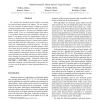Free Online Productivity Tools
i2Speak
i2Symbol
i2OCR
iTex2Img
iWeb2Print
iWeb2Shot
i2Type
iPdf2Split
iPdf2Merge
i2Bopomofo
i2Arabic
i2Style
i2Image
i2PDF
iLatex2Rtf
Sci2ools
108
click to vote
LICS
2009
IEEE
2009
IEEE
Qualitative Determinacy and Decidability of Stochastic Games with Signals
We consider the standard model of finite two-person zero-sum stochastic games with signals. We are interested in the existence of almost-surely winning or positively winning strategies, under reachability, safety, B¨uchi or coB¨uchi winning objectives. We prove two qualitative determinacy results. First, in a reachability game either player ¤ can achieve almost-surely the reachability objective, or player ¥ can ensure surely the complementary safety objective, or both players have positively winning strategies. Second, in a B¨uchi game if player ¤ cannot achieve almostsurely the B¨uchi objective, then player ¥ can ensure positively the complementary co-B¨uchi objective. We prove that players only need strategies with finite-memory, whose sizes range from no memory at all to doubly-exponential number of states, with matching lower bounds. Together with the qualitative determinacy results, we also provide fixpoint algorithms for deciding which player has an almostsurely winn...
CoB¨uchi Winning Objectives | Computer Science | LICS 2009 | Lower Bounds | Zero-sum Stochastic Games |
| Added | 24 May 2010 |
| Updated | 24 May 2010 |
| Type | Conference |
| Year | 2009 |
| Where | LICS |
| Authors | Nathalie Bertrand, Blaise Genest, Hugo Gimbert |
Comments (0)

